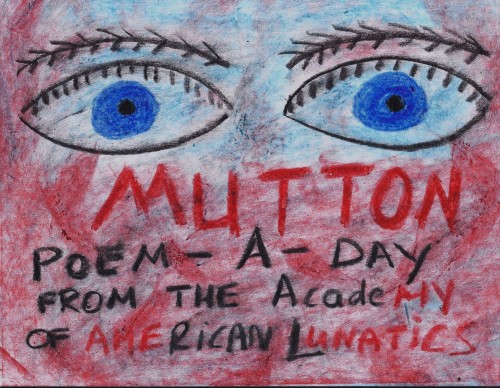Virtual Book Tour: Zarina Zabrisky
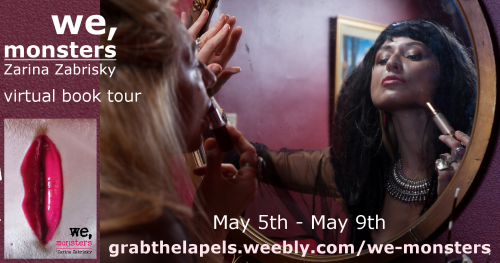
HTMLGIANT welcomes Zarina Zabrisky, author of the novel We, Monsters (2014, Numina Press). In the novel, a wife and mother searches the internet for a job as a dominatrix. She needs the experience; it’s research for a novel she’s writing about her dead sister. Taking the name Mistress Rose, she learns the darkest desires of the human psyche while slowly doubting her own perception of reality. Rose’s manuscript ends up in the hands of clinical psychologist Dr. Michael H. Strong, who adds footnotes in which he analyzes Mistress Rose’s behaviors and undoing.
As part of her virtual book tour, Zarina gives you a “Top Ten” list of what she did to write We, Monsters. The novel took seven years’ worth of research to complete:
1. Read and re-read the major works of Freud and Nietzsche. I felt that I didn’t understand most of it but loved the process. Read and analyzed articles and research work by modern psychologists to feel the style.
2. Studied Diagnostic Criteria from DSM-IV-TR (the major directory for psychiatrists). Diagnosed myself with each and every disorder and affliction.
3. Composed a glossary of Paraphilia terms.
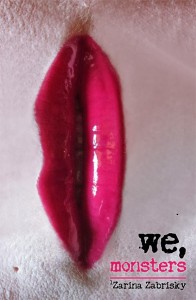 4. Wrote a fake philosophy book from the point of view Dr. Michael H. Strong to master his personal writing style. The book is called Survival and Procreation. The world will never see it.
4. Wrote a fake philosophy book from the point of view Dr. Michael H. Strong to master his personal writing style. The book is called Survival and Procreation. The world will never see it.
5. Worked as an apprentice dominatrix at a small dungeon in Oakland (for six months). It is the only job I got fired from (for insisting on wearing rubber gloves…)
6. Studied (and failed) a manual on knot-making for bondage. I suck at knots.
7. Studied architecture books and photographs on the Potemkin Stairs and the Odessa Opera Theater (I have never been inside) to create an accurate setting.
8. Watched Battleship Potemkin in detail and many documentaries about it. Cried every time.
9. For a year, studied (almost non-existent) works on female sexual fantasies. Discovered that unlike male sexual fantasies, those are astonishingly under-studied. Also, discovered that women have very diverse sexual fantasies and some elements that appeal to some women might never occur to others (kitchen objects and agricultural items, for instance, have never crossed my mind. I am not a good housewife.)
10. Learned the rules and played Lemmings, a computer game not known to me—as pretty much every other computer game still unknown to me. Lemmings are cute.
You can purchase We, Monsters here.
***
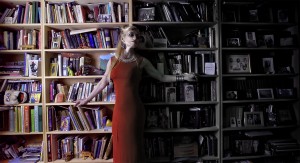 Zarina Zabrisky is the author of short story collections IRON (2012, Epic Rites Press), A CUTE TOMBSTONE (2013, Epic Rites Press), a novel We, Monsters (2014, Numina Press), and a book of poetry co-authored with Simon Rogghe (forthcoming in 2014 from Numina Press). Zabrisky started to write at six. She earned her MFA from St. Petersburg University, Russia, and wrote while traveling around the world as a street artist, translator, and a kickboxing instructor. Her work appeared in over thirty literary magazines and anthologies in the US, UK, Canada, Ireland, Hong Kong, and Nepal. A three-time Pushcart Prize nominee and a recipient of 2013 Acker Award for Achievement in The Avant Garde, Zabrisky is also known for her experimental Word and Music Fusion performances.
Zarina Zabrisky is the author of short story collections IRON (2012, Epic Rites Press), A CUTE TOMBSTONE (2013, Epic Rites Press), a novel We, Monsters (2014, Numina Press), and a book of poetry co-authored with Simon Rogghe (forthcoming in 2014 from Numina Press). Zabrisky started to write at six. She earned her MFA from St. Petersburg University, Russia, and wrote while traveling around the world as a street artist, translator, and a kickboxing instructor. Her work appeared in over thirty literary magazines and anthologies in the US, UK, Canada, Ireland, Hong Kong, and Nepal. A three-time Pushcart Prize nominee and a recipient of 2013 Acker Award for Achievement in The Avant Garde, Zabrisky is also known for her experimental Word and Music Fusion performances.
Tommy Pico’s Absent Mindr

Poetry and eBooks have never played well together because, for instance, fixed line lengths don’t jive with the reader’s ability to adjust type size (poetry is too rigid). There are, of course, some clunky workarounds, like including a note for users to match their settings so that the longest line in the book is unbroken. Certainly this doesn’t have to be an issue; it’s something an HTML5 developer could solve quickly, I think—but why should they?
Limitations drive ingenuity. I’ve often wondered if, say, no one figured out how to make cars, would something else have been invented? Antimatter transportation!
Tommy Pico, who does Birdsong, released what he calls the first poetry App (for iOS and tablets) yesterday. Called Absent Mindr, it’s a “ch-app” he says—of course it is!—with 24 poems in four sections, situated alongside audio playback of him reading the poems, and bright collages by Cat Glennon.
The poetry is cool. That’s first. I really appreciate that the literature isn’t secondary to techcrunches, and the press release for this app is all about the poetry. Certainly it’s good stuff (read “Inheritance” at Best American Poetry), and Tommy “Teebs” Pico’s voice is pitch perfect on the audio (which can be listened to when you’re not connected, like on the subway, because all the content is a download), but what I’m really impressed by and excited about is the presentation, which is slick and gorgeous. It’s antimatter transportation to cars. The app considers the poetry, the art matches the tone. Books rarely match content with UX this well.
I think apps are expensive to create, whereas eBooks are free—but Absent Mindr suggests there’s a good future for presenting poetry this way. As startups like Atavist, Byliner, Oyster, Zola, Wattpad, Readmill (RIP) and Medium etc explore how to monetize this new frontier, it will be interesting to see what DIY pioneers like Tommy Pico create in the margins.
Anecdotally, I got my hands on the app just a day before I went to NYC for the Chapbook Festival. He did a good job spreading the word, because the room was abuzz about it (ie. three or four people mentioned the app to me while I was there). Chapbooks are a space traditionally reserved for handmade, crafty, papery books that fold, but they are open to sweet new fields like—may I suggest—chappbooks.
Cris Mazza Virtual Book Tour Stop
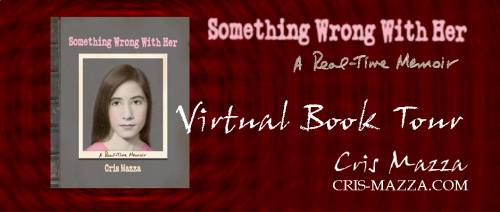
Cris Mazza stops at HTMLGIANT as part of her virtual book tour…
***
Cris Rants:
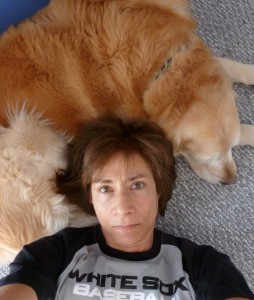 I was prepared to sit here and rant about having to change my author photo to a more friendly, smiling image, certain that practically zero men ever get told they need a smiling photo (or to “look cute” as another writer wrote about being advised). This advice (and that I felt pressured to follow it) was particularly troubling this time, for this book: because the book is nonfiction, because part of it is about female sexual dysfunction, about not feeling sexy in a sex-hungry, sexiness-demanding world. The photo I had chosen, a selfie, showed the mood I thought the narrative conveyed.
I was prepared to sit here and rant about having to change my author photo to a more friendly, smiling image, certain that practically zero men ever get told they need a smiling photo (or to “look cute” as another writer wrote about being advised). This advice (and that I felt pressured to follow it) was particularly troubling this time, for this book: because the book is nonfiction, because part of it is about female sexual dysfunction, about not feeling sexy in a sex-hungry, sexiness-demanding world. The photo I had chosen, a selfie, showed the mood I thought the narrative conveyed.
 When the smiling photo was requested (not by my publisher), I didn’t have the time (and was very low on inclination) to create another photo, to “try” to smile for it without appearing conscious it had been requested. So I went back to the most recent photo I had where I was smiling (also containing my dog, the same dog, so not that long ago). Unfortunately, it was taken in the summer and I was wearing a tank top. I truly and firmly did not want to be showing skin in the author photo for this book.
When the smiling photo was requested (not by my publisher), I didn’t have the time (and was very low on inclination) to create another photo, to “try” to smile for it without appearing conscious it had been requested. So I went back to the most recent photo I had where I was smiling (also containing my dog, the same dog, so not that long ago). Unfortunately, it was taken in the summer and I was wearing a tank top. I truly and firmly did not want to be showing skin in the author photo for this book.
I’ve seen too many books by women recently where the author photo is beyond “you’re pretty when you smile.” From seductive to downright trampy, wearing a lacy slip or camisole, professionally made-up, professionally applied cleavage (if none was readily available). Why do we have to look ready for sex to have our books respected, or just read?
Did I say respected? I was pleased to be reviewed recently in an esteemed review vehicle, but I’d like to assume the header was not written by the reviewer, because the title completely trivializes the three books covered in the review. “On Losing It And Other Chick Stuff.” I can’t imagine a book by a man that reveals a lifetime of erectile dysfunction would have been devalued as though it was about boys snapping towels in the locker-room.
Ok, so I did start my rant. I was going to say I didn’t need to write it because before I did, Rae Bryant posted this:
I find it interesting when editors or presses promote an International Women’s Day when their aesthetic really only promotes women writers writing about sexy sex. Don’t get me wrong. I like the sexy sex in literary fiction when it’s done well and witty (toooo many times it’s not) but International Women’s Day really requires a sense for GENDER EXPLORATION, including sex in all its sexiness and dark and nasty. Just aren’t a whole lot of editors who really know what that is. A few who really do.
There also seems to be a collect of editors/publishers who publish the “sweetheart crowd.” Male run/fraternity like publications who have decided upon their “fraternity sweethearts.” These fraternity sweethearts must have the following attributes:
- DO NOT bitch about our maleness in any shape or form.
- You MUST entertain us by sexy words on page and more preferable, a willingness to perform your sexiness at readings and other such events.
- A constant sense of humor about your gender. If you get PMSey at any point in time, we reserve the right to oust you, our boy club friends will oust you and you’ll never again be on the fraternity sweetheart list. Blacklisted. Or Blackballed.
Of course no one’s going to name names, me included, but … over a drink somewhere, I’d love to hear the experiences that brought this out on a Friday afternoon. My little author photo misery might have to take a smaller role in a larger conversation.
***
Cris Mazza is the author of over 17 books, including Various Men Who Knew Us as Girls, Waterbaby, Trickle-Down Timeline, and Is It Sexual Harassment Yet? Her first novel, How to Leave a Country, won the PEN/Nelson Algren Award for book-length fiction. Mazza has co-edited three anthologies, including Men Undressed: Women Writers on the Male Sexual Experience. In addition to fiction, Mazza has authored collection of personal essays, Indigenous: Growing Up Californian. Currently living 50 miles west of Chicago, she is a professor in the Program for Writers at the University of Illinois at Chicago.
“My Cat Had To Have His Penis Cut Off:” An Interview with Dustin Long
Shane: Can you talk about what’s happened since we last spoke?
Dustin: Well, you were pretty much spot on with your predictions: Bad Teeth got picked up pretty soon after we spoke; Pavilion hasn’t been so lucky, though I’m not actively trying to sell it. I realized a little while ago that I want to make some revisions and additions to it, which I plan to get to as soon as I put the finishing touches on a third novel I’ve been working on.
POEM-A-DAY from THE ACADEMY OF AMERICAN LUNATICS (#16)
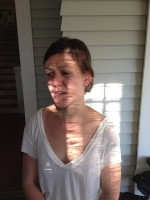
Tara Atkinson is a writer in Seattle. She is one of the founders of APRIL, a festival of small press and independent literature. Her chapbook, BEDTIME STORIES, is available from Alice Blue Books
for Those
About to Order
by
Tara Atkinson
![]()
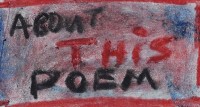 It’s a story in sheep’s clothing. // I had permission to take video of some sheep, but I jumped the wrong fence. // This was actually the first bedtime story I wrote, at least a couple years before the collection was going to be a thing.
It’s a story in sheep’s clothing. // I had permission to take video of some sheep, but I jumped the wrong fence. // This was actually the first bedtime story I wrote, at least a couple years before the collection was going to be a thing.
![]()
note: I’ve started this feature up as a kind of homage and alternative (a companion series, if you will) to the incredible work Alex Dimitrov and the rest of the team at the The Academy of American Poets are doing. I mean it’s astonishing how they are able to get masterpieces of such stature out to the masses on an almost daily basis. But, some poems, though formidable in their own right, aren’t quite right for that pantheon. And, so I’m planning on bridging the gap. A kind of complementary series. Enjoy!
Adam Fell’s “DEAR CORPORATION”
“…………Dream at night always of
your loved ones in danger. Wake tangled in
the gauze of your sheets. Draw yourself a
hot bath. Unhood the windows. It’s
becoming harder and harder to tell whether
the motion detector has been triggered or
it’s already morning. Try to practice your
breathing. Let the day open up to you with
the hiss of automated doors. Find something
in the near distance to look forward to. Hold
on. Even if the boot is crushing your fingers.”—from Adam Fell’s new “DEAR CORPORATION“
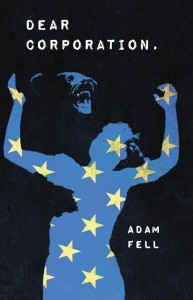
I met Adam Fell when I read in Madison, WI at the wonderful Monsters of Poetry which Adams helps curate. At dinner after the reading Adam talked about the huge demonstrations at the Capitol that he’d been a part of in early 2011. And if memory serves me Adam then talked about he then began writing the poems that now constitute DEAR CORPORATION (released last month, H_NGM_N Books). Poems, thus, that were born out of the feelings of anger, impotence, vulnerability, etc, that ones feels when at the mercy of something much bigger and colder and pure-predator.
“………………Distrust the
unconflicted, the unaccountable, the
unworried, the unwounded. Distrust your
own impulse to leave your love in the ruins.
Your pain is not the only pain, not the worst
pain. Your guilt is not the only guilt, not the
worst guilt”—from DEAR CORPORATION
Overboard
I.
On this particular evening, the musician allows his fellow lodger in the house on Rue d’Auseil to listen to his feverish viol music. “It would be useless to describe the playing …. He was trying to make a noise; to ward something off or drown something out—what, I could not imagine,” writes H.P. Lovecraft in “The Music of Erich Zann.” The listener, a metaphysics student at an unnamed university, is an interloper, a voyeur who, on hearing Erich Zann fill his garret room with this crazed playing, hopes to peak into the source of the music’s beauty, to penetrate some “far cosmos of the imagination.” On this particular evening, the cosmos stabs back. Lovecraft describes Zann’s playing, which grows “fantastic, delirious, and hysterical …. [l]ouder and louder, wilder and wilder,” until other-worldly chaos and pandemonium explode into the house on Rue d’Auseil and the listener flees. It is a bit much.
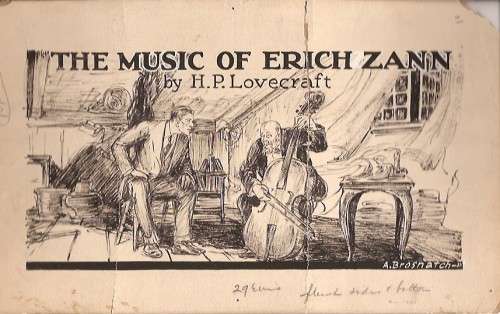
Howard Philips Lovecraft wrote “The Music of Erich Zann” in 1917. Over the next 20 years, he would go on to write his best known tales of horror and wonder, those involving Cthulhu, Nyarlathotep, and Azathoth, his mythos monsters, the Great Old Ones whose names you can’t pronounce. The language in “Erich Zann” is toned-down, tolerable, a pale lilac compared to the rich purple of his later prose, where, as Michel Houellebecq writes, “the adjectives and adverbs pile upon one another to the point of exasperation, and he [Lovecraft] utters exclamations of pure delirium.” Most readers would not consider anything by H.P. Lovecraft well-written in the traditional sense, and yet there is power in his work, a majestic and odd darkness that isn’t matched by much else, an appeal to the unimaginable, our dread of looking into the night sky and hoping, only hoping, we’re alone. Lovecraft’s best sentences are always overwrought. There are excesses of bland fright words—“monstrous”, “horrible”, “grotesque”—mixed with archaic vocabulary, weird words that both in texture and meaning evoke the unusual, “eldritch”, “rugose”, “squamose”; there are extended hallucinations, delirious exclamations, and dream descriptions of nightmare cities, all of which are the antithesis of subtlety. All stylistic restraint has been set aside. Lovecraft eschews any kind of linguistic modesty so he can unleash his unmistakably curious vision of cosmic horror and god-things—this is the source of his style.
“HPL would probably have considered a story a failure, if in writing it he did not have a chance to go overboard once at least,” Houellebecq writes in H.P. Lovecraft: Against the World, Against Life (published in France in 1991; translated into English by Dorna Khazeni and published by Believer Books in 2005). Houellebecq, a French novelist who writes about sex, brand names, technodystopian malaise, and ennui-ridden postmodern consciousness (very French, yes), sees Lovecraft as an American original whose uncompromising weirdness and “stylistic explosion[s]” lead to a unique body of work, the sole goal of which is to fascinate the reader. Houellebecq sets Lovecraft up against more mundane sci-fi and horror writers and against all realism. Lovecraft, Houellebecq argues, whose style is defined by precisely that which it’s easiest to criticize, is interesting not in spite of his grandiose and ridiculous prose, but because of it.
Penny Goring’s LOVE TESTER DELUXE is now available as an E-book from Peanut Gallery Press and you can check it out here
Edward Mullany Interviews Melissa Broder
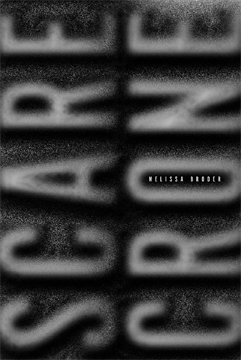 Every time a new book comes out from Publishing Genius, the author is interviewed by the author of the previous PGP book. I’m pleased to present a bunch of questions that Edward Mullany (author of Figures for an Apocalypse) posed to Melissa Broder (author of SCARECRONE). —Adam Robinson
Every time a new book comes out from Publishing Genius, the author is interviewed by the author of the previous PGP book. I’m pleased to present a bunch of questions that Edward Mullany (author of Figures for an Apocalypse) posed to Melissa Broder (author of SCARECRONE). —Adam Robinson
EDWARD: Can you talk about the figure of the “Scarecrone” as she relates to your book as a whole? What is her significance?
MELISSA: The Scarecrone personifies my fears around time, death, and the loss of physical beauty / sexual desirability. She is a dry succubus, a cautionary tale of the inevitable and the perceived inevitable. She is a mirage. But she is a powerful mirage. She is dangerous in her unreality. She may have something wise to teach. On a social level, one might say she is the ghosts of discarded women in a culture obsessed with youth, though this book doesn’t really fuck with culture, because I don’t really fuck with culture. I fuck with me, mostly, and my own obsession with youth. I fuck with time. I fuck with fucking. Also death.
To your mind, is the difference between “the inevitable and the perceived inevitable” a significant one? What is that difference?
I made the distinction here, because death is (historically) inevitable, whereas time’s slow, cruel drain on my worth as a human being is a perceived inevitability. Where did I get this fear that to grow old is to become worthless? Did I get it from culture? From my mother? From nature? It isn’t a truth in the way that death is a truth. And intellectually, I know it’s not a truth at all. But to me, on a visceral level, it’s a very real fear. And it dictates a lot of my actions. And I can probably make it true if I believe it enough, or at least I can will my own misery. So I guess I’d say that the inevitable and the perceived inevitable are different, but that one’s reality and one’s perceived reality are the same.
You mention that the Scarecrone can be understood as a sort of succubus. Does this suggest that your poems are concerned as much with the supernatural, or spiritual, as they are with the physical? Or does it suggest something else?
I tend to negate the value of the physical world and reach for realms of fantasy, the imagined, the spiritual. I think that’s because I’ve always found it difficult to live in a body and sought union with something bigger than me for relief. It’s that tension between soul and body that compels me to write poetry. If I could choose my ideal god it would be a god that protects me from pain, from people, from life–a god that makes me feel blissed 100% of the time. It would basically be heroin, except it wouldn’t be a false god, because I wouldn’t be dependent on anyone or anything for it. And I would never come down. And believe me when I say that I have tried to make many tangible things into this god. And believe me when I say that you always come down. I mean, I have had a lot of those peak experiences in life–those ecstatic whoa moments that feel lotusy and like I imagined ‘spirituality’ would be. I am a succubus for those moments. But I’ve found that even when they aren’t attached to a drug or a lover or a guru or X or Y, they aren’t sustainable. But then there is this other kind of spirituality that is tangible, not as showy, the kind that works through people, action based, pause-based, stillness, quiet moments of gratitude for nothing, a not-reaching for glitter, a more Earthy spirituality, laughter. Its lack of glitter, its humanity, is counterintuitive to me. And it is exactly what I need. It has been instrumental in keeping me on the planet.
READ MORE >

